BBC America's CripTales does more with 15-minute shorts than some portrayals of disability do with a feature-length film, and that speaks to a fundamental truth about work written, directed, and acted in by the people whose stories it tells: it's just better. In the words of novelist Margaret Echard, "Truth is not only stranger than fiction, but far more interesting."
Why, then, do we settle for able-bodied people's imagination of disability when reality is far more rich, far more vibrant, and far more powerful than Hollywood has ever given it credit for? That's what Mat Fraser (His Dark Materials, American Horror Story [1]) wants viewers to ask after watching the series of six shorts that he curated for the BBC — including his own. "What I would hope is that they find themselves dissatisfied with lesser portrayals of disability — with less authentic versions of what they know in their insides is the truth," Fraser said. "And to not put up with it."
Coproduced by BBC Studios' documentary unit, CripTales tackles modern-day issues of disability through fictional monologues and does it superbly well. No wonder, when every actor, writer, and director attached to the project is disabled: a landmark for representation. If this series teaches us viewers anything, it's that people with disabilities deserve all the grace to speak for themselves that able-bodied people enjoy by default. And for a community of actors and creatives whose talents we have yet to know enough of in the UK, Fraser, 58, has been able to give just that.
In honor of National Disability Employment Awareness Month, CripTales is now available to stream for free and without a log-in on BBC America [2], AMC, IFC, SundanceTV, and AMC+ throughout October. Ahead of the series's Oct. 1 premiere, Fraser spoke with us over the phone about curating these shorts, how to nab an Oscar, and why "there's never been a better time to be disabled in drama."
POPSUGAR: I watched the shorts, and they are absolutely beautiful, Mat. What was it like working with an all-disabled cast and production on this series, because I imagine that must be an extremely rare experience?
Mat Fraser: Well, it was. And, you know, Chris, I've been at this game for about 25 years, and I've built up a large body of partners and colleagues in disability in drama, and you know, it was, frankly, stunning to be able to get this opportunity. I mean, we were in the studio doing it, you know, four or five of us would look at each other around the table, saying, "Whoooooa. Wow." We couldn't quite believe it was happening.
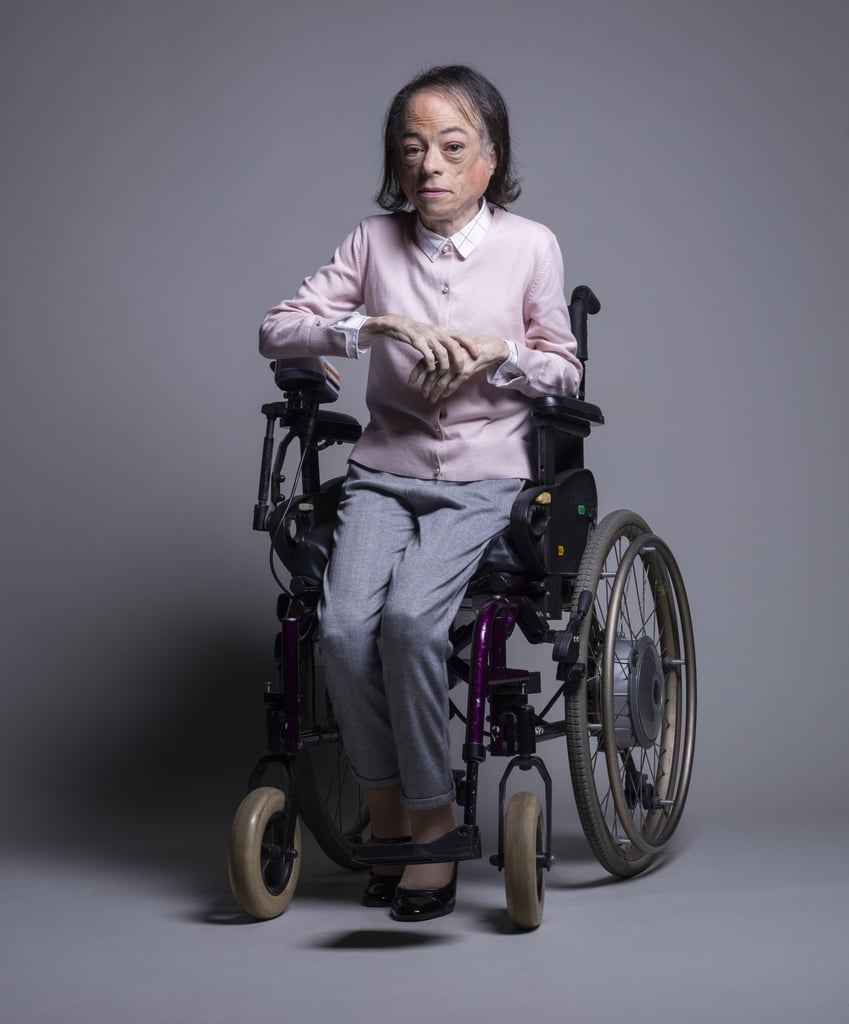
PS: Did it feel overdue?
MF: It is overdue. You know, it's wonderful that we're having it now. I feel that it probably should have been 20 years ago, but it isn't: it's now, and I'm very glad. And I was super glad to get the gig of curating, because I do know an awful lot of really talented disabled people who are ready for exposure or what we might call "mainstream" drama exposure, but just haven't been casted or haven't been given the opportunities.
"It's 'pinch me, is this real?' And, yes it is: joyously, fantastically real."
I think about Tom Wentworth, who wrote "The Real Deal," which has Liz Carr, star of BBC's Silent Witness, acting in it. It's his first script on television, but he's been working in television as a script writer for five years. He's farmed out on that thing, and that thing, and going to write for this procedural, or that series, and he writes what we call a dummy episode. But never quite being trusted to do that thing. You know, this is his and many others' first time they've had their scripts on television — myself included! I've been trying to get my writing seen for ages, but this is the first opportunity. So, it's thrilling. It's "pinch me, is this real?" And, yes, it is: joyously, fantastically real.
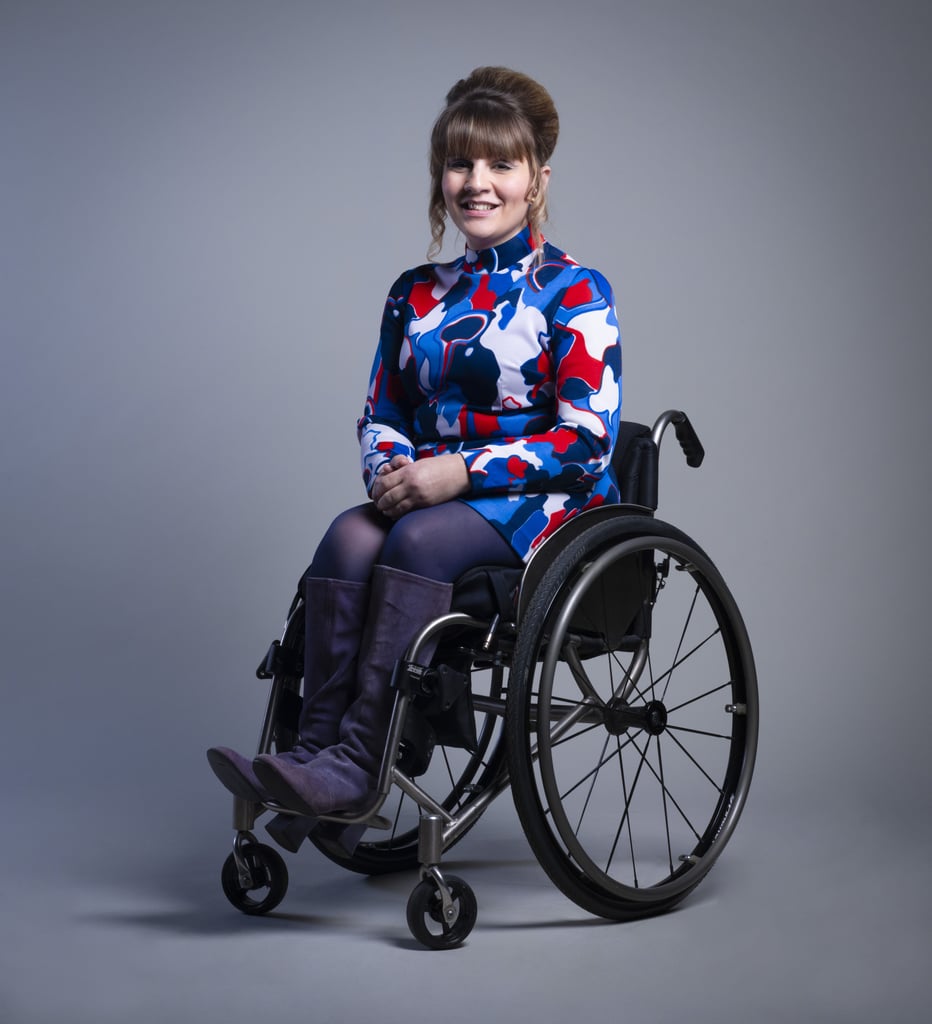
MF: And, of course, the crew. I'm used to having to explain everything from the second I get to the front door of any environment, but the BBC is really good with disability, actually — especially in drama.
PS: I'm learning that!
MF: For years now, they haven't permitted able actors to play disabled characters. I mean, they've got a real policy that is working. Ruth Madeley in Years and Years, which I know is on BBC America — fantastic. We've managed to get her for one of our monologues by Genevieve Barr. So I'm just, like, happy as a pig in the nicest, most natural environment you can imagine. Super happy.
!["I want to think that every single participant — actor, writer, director — will get more television work as a direct result of this being broadcast."
MF: You know, I always have misgivings, born of my experiences of the past. And I'm trying to go, "It'll go different this time." There is a little bit lagging in my head like, is this it? Is this just gonna be it, like, "We've done those. And now we don't need to do disability anymore . . . in that authentic way"? I don't think so. I want to think that every single participant — actor, writer, director — will get more television work as a direct result of this being broadcast. That is my real hope, Chris, to be honest. I'm like any actor: I want an Oscar. [laughs] But the creation of disabled awareness that I've had in doing this has been my crowning joy. It's the one thing I'm most proud of in my whole professional life. "I want to think that every single participant — actor, writer, director — will get more television work as a direct result of this being broadcast."
MF: You know, I always have misgivings, born of my experiences of the past. And I'm trying to go, "It'll go different this time." There is a little bit lagging in my head like, is this it? Is this just gonna be it, like, "We've done those. And now we don't need to do disability anymore . . . in that authentic way"? I don't think so. I want to think that every single participant — actor, writer, director — will get more television work as a direct result of this being broadcast. That is my real hope, Chris, to be honest. I'm like any actor: I want an Oscar. [laughs] But the creation of disabled awareness that I've had in doing this has been my crowning joy. It's the one thing I'm most proud of in my whole professional life.](https://media1.popsugar-assets.com/files/thumbor/HsJ0u4YYiexNr_tfIuj1mSJcpas/fit-in/1024x1024/filters:format_auto-!!-:strip_icc-!!-/2020/10/01/970/n/44490375/1ad400a492b371ca_CRIPTALES_106_T7A6474/i/I-want-to-think-that-every-single-participant-actor-writer.jpg)
"I want to think that every single participant — actor, writer, director — will get more television work as a direct result of this being broadcast."
MF: You know, I always have misgivings, born of my experiences of the past. And I'm trying to go, "It'll go different this time." There is a little bit lagging in my head like, is this it? Is this just gonna be it, like, "We've done those. And now we don't need to do disability anymore . . . in that authentic way"? I don't think so. I want to think that every single participant — actor, writer, director — will get more television work as a direct result of this being broadcast. That is my real hope, Chris, to be honest. I'm like any actor: I want an Oscar. [laughs] But the creation of disabled awareness that I've had in doing this has been my crowning joy. It's the one thing I'm most proud of in my whole professional life.
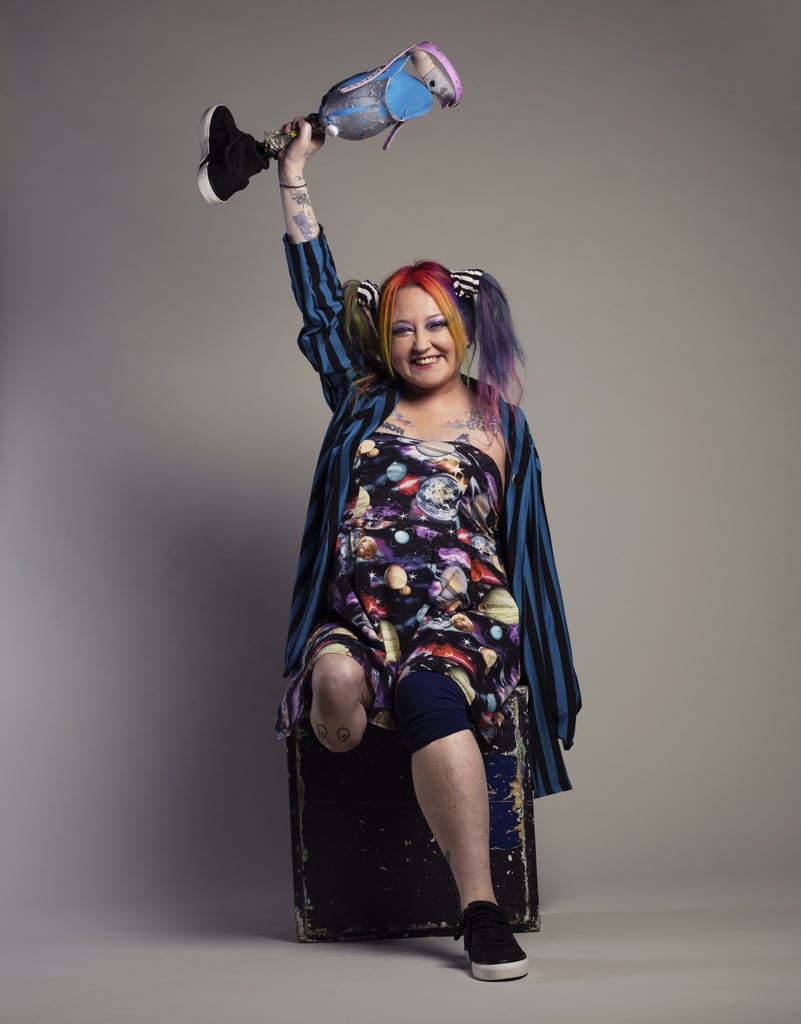
PS: Watching these shorts, I thought, there is so much untapped talent here — even that is an understatement. And so to have this platform, I would love to see this project become a launchpad. That leads to the question of, is there conversation of this being a longer-form project: full-length episodes, a season two?
MF: Well, not at the moment. I think everyone's waiting to see the reactions once they've been broadcast. But you know, real drama, as anyone will tell you, is interaction between two people. Monologues are great. Duologues are going to be a helluva lot more exciting potentially, right?
PS: Oh yeah.
MF: So I was thinking, maybe a duologues season might be nice. You know, more monologues from more people.
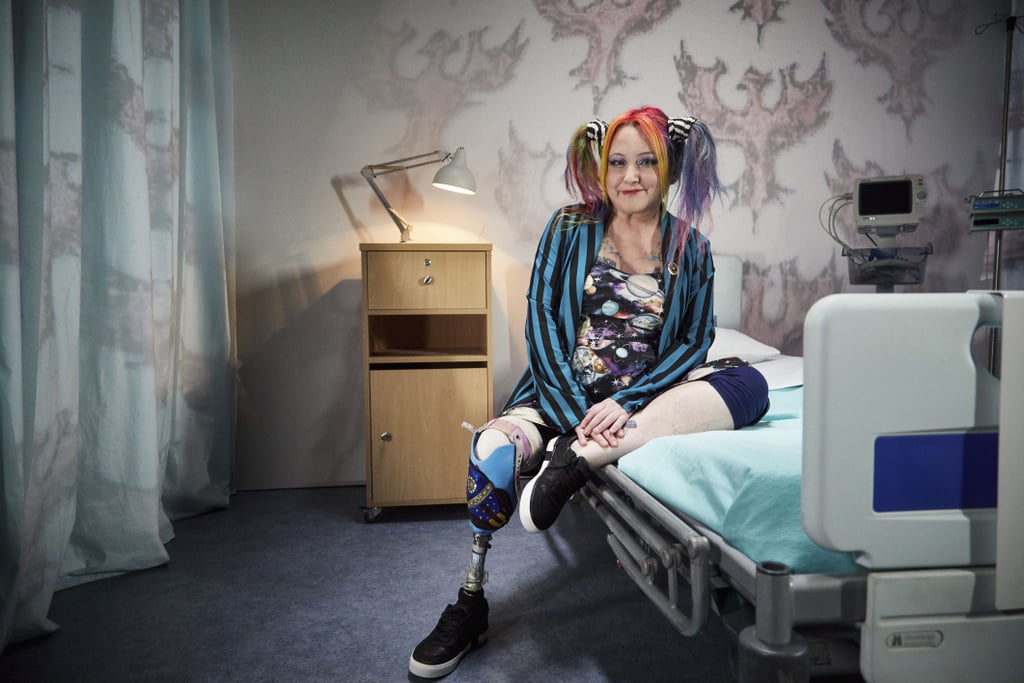
MF: There are a lot of subgroups of people that deserve their go at the monologues. For example, cancer sufferers. I mean, cancer is such a hugely ranging illness that it would easily eat up six monologues. So I think, realistically, my hopes are that each individual gets more work. Would I like to do another one like this, but call it "Duologues," and spend a year putting the people together? Would it be two crips? Would it be a famous actor and a crip in a duologue, to attract lots of attention to it? All these are possible. I don't want to name names, but . . .
PS: But . . .
MF: There are some incredibly famous people who I did approach for this.
PS: OK!
MF: And two that come to mind, and the only reason they didn't — 'cause they were fascinated by the idea — was because they were already busy, 'cause famous people tend to be working all the time.
PS: They do, don't they?
![MF: But I got close! I got close, and that was exciting. I was like, "Wow, the climate's really changed." There isn't all this embarrassment around disability anymore. Because in the old days, all we saw were embarrassing portrayals of disability [and] disabled people that were problematic, to do with impairment and people's negative reactions. And all that sort of issue-based rubbish has fallen away now. I think people are really encouraging. They want to see better portrayals of disabled people, and if they can, they want to help make that happen. I mean, I'm directly talking to the television industry here, Chris, as you may or may not realise.
"Our time is now. There's never been a better time to be disabled in drama."
PS: Oh, I get it. The floor is yours.
MF: [louder] Our time is now. There's never been a better time to be disabled in drama. And, award hunters, all I'll say is this: we know traditionally that the quickest way to get an award is to portray a disabled person, but those days are gone. So, what are the new days? I would suggest the new awards coming are for the best new disability project: where the writing is essential, the acting is incredible, and it blows people's minds. That stuff's gonna get the big awards. My question to you in the television industry is, who's gonna take the plunge, and who's gonna be the copycat? That's all I wanna say. And who's gonna miss out completely? MF: But I got close! I got close, and that was exciting. I was like, "Wow, the climate's really changed." There isn't all this embarrassment around disability anymore. Because in the old days, all we saw were embarrassing portrayals of disability [and] disabled people that were problematic, to do with impairment and people's negative reactions. And all that sort of issue-based rubbish has fallen away now. I think people are really encouraging. They want to see better portrayals of disabled people, and if they can, they want to help make that happen. I mean, I'm directly talking to the television industry here, Chris, as you may or may not realise.
"Our time is now. There's never been a better time to be disabled in drama."
PS: Oh, I get it. The floor is yours.
MF: [louder] Our time is now. There's never been a better time to be disabled in drama. And, award hunters, all I'll say is this: we know traditionally that the quickest way to get an award is to portray a disabled person, but those days are gone. So, what are the new days? I would suggest the new awards coming are for the best new disability project: where the writing is essential, the acting is incredible, and it blows people's minds. That stuff's gonna get the big awards. My question to you in the television industry is, who's gonna take the plunge, and who's gonna be the copycat? That's all I wanna say. And who's gonna miss out completely?](https://media1.popsugar-assets.com/files/thumbor/94kOgU0oM1MbPcpgY_GDzucONeM/fit-in/1024x1024/filters:format_auto-!!-:strip_icc-!!-/2020/10/01/970/n/44490375/4b1f96bb97913fee_CRIPTALES_102_T7A5211/i/MF-But-I-got-close.jpg)
MF: But I got close! I got close, and that was exciting. I was like, "Wow, the climate's really changed." There isn't all this embarrassment around disability anymore. Because in the old days, all we saw were embarrassing portrayals of disability [and] disabled people that were problematic, to do with impairment and people's negative reactions. And all that sort of issue-based rubbish has fallen away now. I think people are really encouraging. They want to see better portrayals of disabled people, and if they can, they want to help make that happen. I mean, I'm directly talking to the television industry here, Chris, as you may or may not realise.
"Our time is now. There's never been a better time to be disabled in drama."
PS: Oh, I get it. The floor is yours.
MF: [louder] Our time is now. There's never been a better time to be disabled in drama. And, award hunters, all I'll say is this: we know traditionally that the quickest way to get an award is to portray a disabled person, but those days are gone. So, what are the new days? I would suggest the new awards coming are for the best new disability project: where the writing is essential, the acting is incredible, and it blows people's minds. That stuff's gonna get the big awards. My question to you in the television industry is, who's gonna take the plunge, and who's gonna be the copycat? That's all I wanna say. And who's gonna miss out completely?
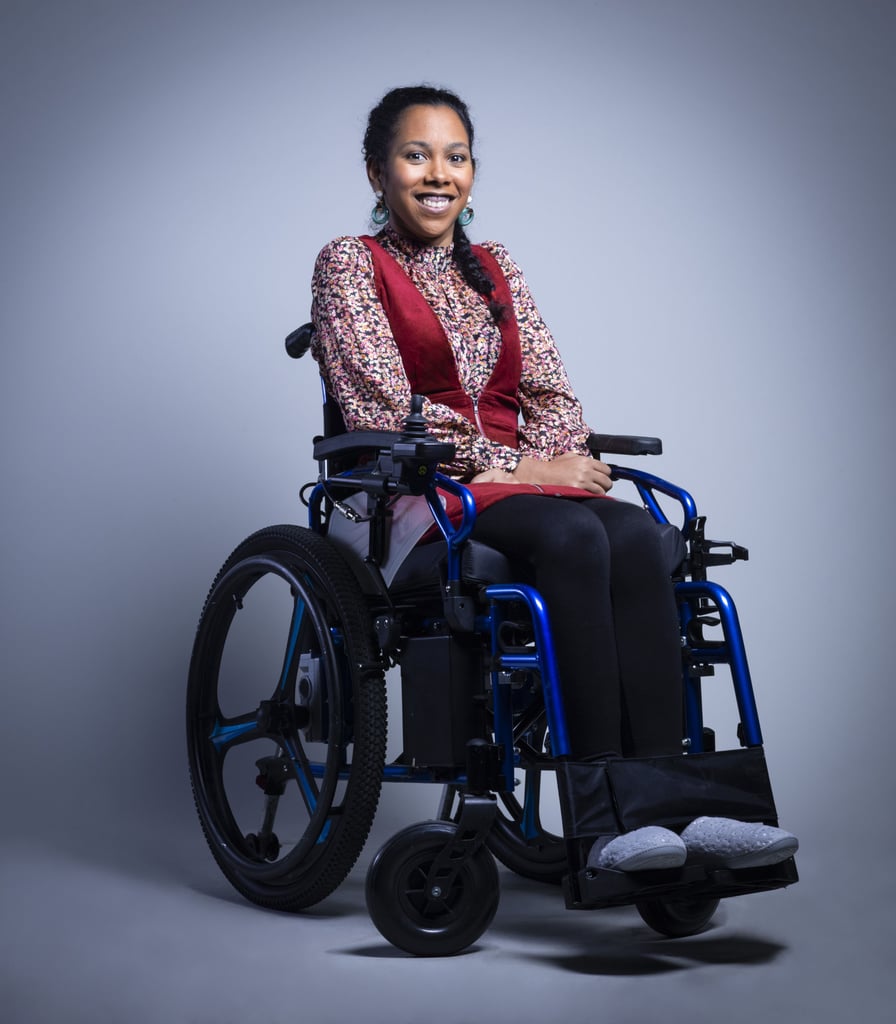
PS: This is a deeply transgressive collection of shorts. They tell the stories of disabled people, queer people — mainly women — who grapple with sex, and desire, and questions like, who's considered fit to be a mother? Who is worthy of love? Who gets to decide what I can and can't do with my own body? What do I deserve out of a carer, or the drug company, or the UK benefits system? I don't know if I've ever seen a Black disabled woman talk about desire for another woman, in TV or in film, period. I would imagine other people might say the same.
"Because everything's too male, too white, and too heterosexual. And too able-bodied."
My understanding is that it was very important to you [3] that the cast be woman-led, but tell me, why?
MF: Wow. Why is it important to me? Because women were treated like second-class citizens until — well, until Me Too? I don't know. Because everything's too male, too white, and too heterosexual. And too able-bodied. And there were a few of those things I could do something about, so we tried to do as much as we could. But, you know, we fielded it out to lots of writers, and the best writers came forward the quickest. So, talent shines, doesn't it?
![PS: Absolutely.
MF: And you recognise it when you see it. It was important, and finding Matilda Ibini, who wrote the one you're talking about, was difficult, you know, because I'm white, and heterosexual, and an old geezer.
PS: Yeah. [laughs]
MF: I'm an old bloke. She wasn't in my direct circle, and, you know, I admonished myself about that and worked out a strategy for not letting that kind of thing happen again. As you say, I don't believe I've ever seen that as a subject matter either. Matilda is definitely an upcoming talent. This is her first television script. PS: Absolutely.
MF: And you recognise it when you see it. It was important, and finding Matilda Ibini, who wrote the one you're talking about, was difficult, you know, because I'm white, and heterosexual, and an old geezer.
PS: Yeah. [laughs]
MF: I'm an old bloke. She wasn't in my direct circle, and, you know, I admonished myself about that and worked out a strategy for not letting that kind of thing happen again. As you say, I don't believe I've ever seen that as a subject matter either. Matilda is definitely an upcoming talent. This is her first television script.](https://media1.popsugar-assets.com/files/thumbor/UwcF9Stzz0Zv97dwSkyIQo3Vnkg/fit-in/1024x1024/filters:format_auto-!!-:strip_icc-!!-/2020/10/01/970/n/44490375/7e6f6b9f32a55c0d_CRIPTALES_105_T7A6146/i/PS-AbsolutelyMF-you-recognise-it-when-you-see-it.jpg)
PS: Absolutely.
MF: And you recognise it when you see it. It was important, and finding Matilda Ibini, who wrote the one you're talking about, was difficult, you know, because I'm white, and heterosexual, and an old geezer.
PS: Yeah. [laughs]
MF: I'm an old bloke. She wasn't in my direct circle, and, you know, I admonished myself about that and worked out a strategy for not letting that kind of thing happen again. As you say, I don't believe I've ever seen that as a subject matter either. Matilda is definitely an upcoming talent. This is her first television script.
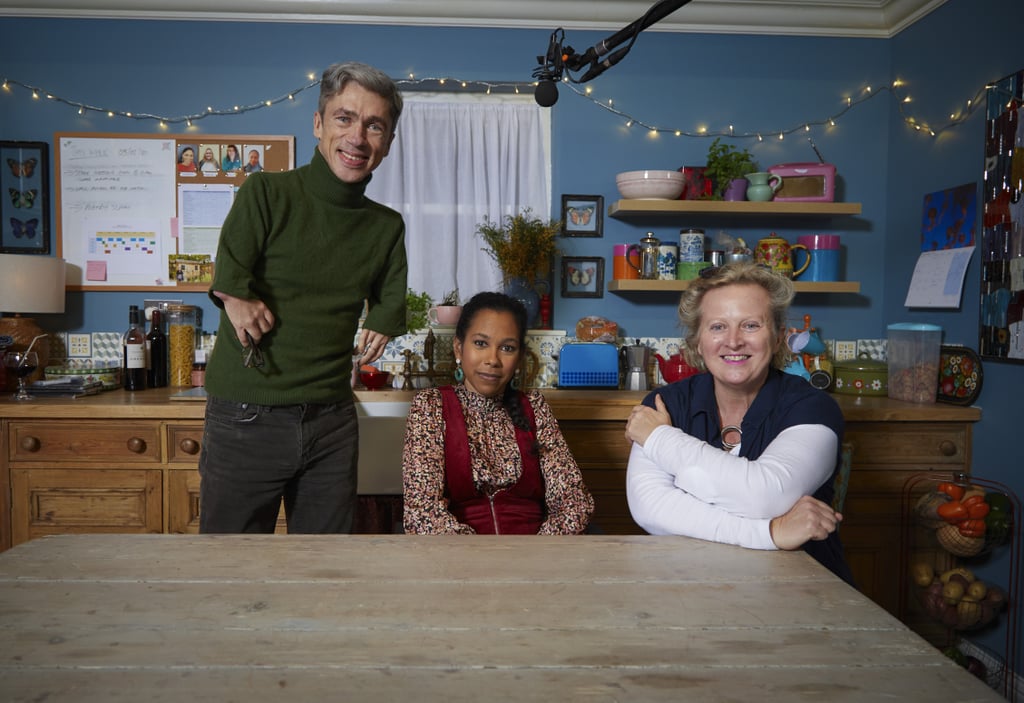
PS: Fantastic.
MF: But she's a name to watch. I believe there's just been an announcement that she's in development with another writer about a feature film [4]. What I'm happy about is that I've got a really good clutch of disabled writers and actors — of course, I've missed out on some of the best ones, that would be inevitable with anybody's collection.
PS: You can't tell every story.
MF: I wish there'd been a visually impaired project, and a little person project. I mean, I didn't want to choose the monologues or writers by the impairment that would be discussed. Because — no, I wanted it to be up to the writers.
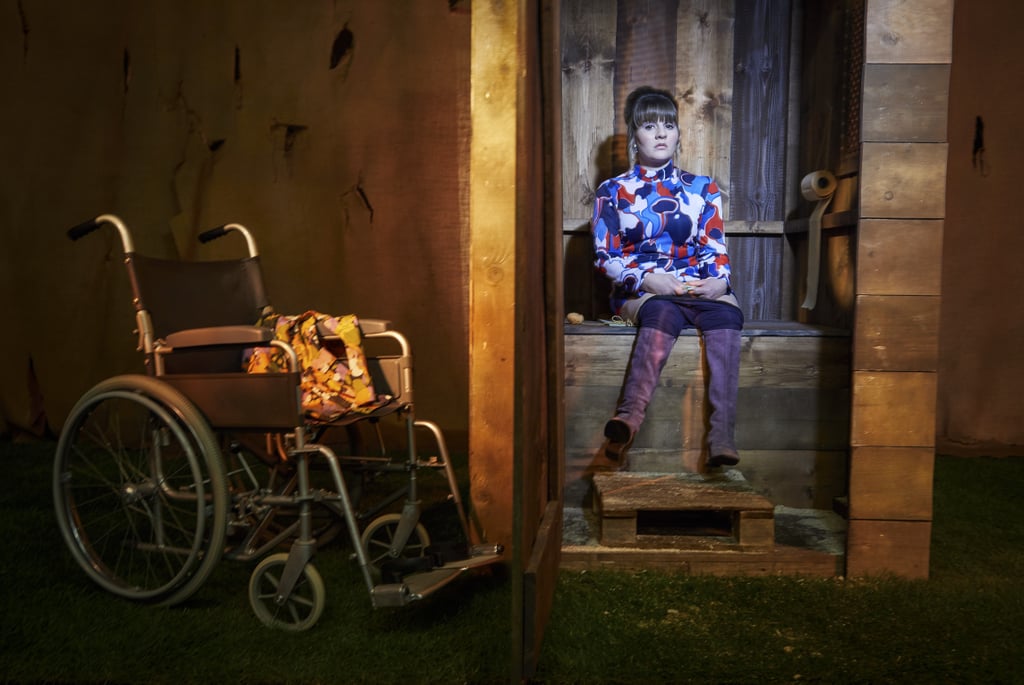
MF: For example, Genevieve Barr, who wrote the one "Thunderbox" about the right to be a mother: she's a deaf writer. And I honestly thought when I commissioned her, she was gonna write a deaf story. But she said no, she wanted to write this particular thing, and when she told us what it was about, we could not say no, of course. That one I find difficult to watch especially toward the end because it's just so upsetting, you know? These things really happen. And like you say, they're very hard-hitting and powerful, some of these.
PS: I mean, that one specifically, "Thunderbox," is so gripping — I was teary by the end. Ruth Madeley is amazing.
MF: Wasn't she good?
![PS: So good. Could you tell me about the making of?
MF: Genevieve said, "I want to write this." It's tied to the year abortion became legal in the UK. I don't want to do a spoiler for anyone reading this before they see the thing, but, you know, we get into it. We get into the history of it, and we loved the story and said, "Absolutely, please write it." And then the setting was difficult, because she wanted it in a pop concert, and BBC Studios said, "Uh, we don't have the budget for that." [laughs]
I mean, we had the tiniest budget: the art department in CripTales deserves a special shout-out, because I was amazed at what they were able to do. But it's called "Thunderbox" because that's the colloquial term for a portable toilet that would've been at a festival back in the late '60s. That's where that story is situated. So, all around the festival is happening, but we're looking at this woman, talking about her own private situation, which is highly emotional, in said toilet: a little unusual, but unusual is good.
And then with the director, we got Amit Sharma, an Asian director, who's up at the Birmingham [Repertory] Theatre — had trained in television and film directing, but just never had the opportunity. So I was delighted to be able to give him that opportunity, and he also directed the one called "Hamish," about the guy that gets his first electric wheelchair and goes and does what he's been waiting to do for a long time. [laughs] PS: So good. Could you tell me about the making of?
MF: Genevieve said, "I want to write this." It's tied to the year abortion became legal in the UK. I don't want to do a spoiler for anyone reading this before they see the thing, but, you know, we get into it. We get into the history of it, and we loved the story and said, "Absolutely, please write it." And then the setting was difficult, because she wanted it in a pop concert, and BBC Studios said, "Uh, we don't have the budget for that." [laughs]
I mean, we had the tiniest budget: the art department in CripTales deserves a special shout-out, because I was amazed at what they were able to do. But it's called "Thunderbox" because that's the colloquial term for a portable toilet that would've been at a festival back in the late '60s. That's where that story is situated. So, all around the festival is happening, but we're looking at this woman, talking about her own private situation, which is highly emotional, in said toilet: a little unusual, but unusual is good.
And then with the director, we got Amit Sharma, an Asian director, who's up at the Birmingham [Repertory] Theatre — had trained in television and film directing, but just never had the opportunity. So I was delighted to be able to give him that opportunity, and he also directed the one called "Hamish," about the guy that gets his first electric wheelchair and goes and does what he's been waiting to do for a long time. [laughs]](https://media1.popsugar-assets.com/files/thumbor/MgFYzK_UYdlaFIFQwpPZN6ouR4k/fit-in/1024x1024/filters:format_auto-!!-:strip_icc-!!-/2020/10/01/970/n/44490375/61a1c67b41e6a5a6_CRIPTALES_103_T7A5436/i/PS-So-good-Could-you-tell-me-about-making.jpg)
PS: So good. Could you tell me about the making of?
MF: Genevieve said, "I want to write this." It's tied to the year abortion became legal in the UK. I don't want to do a spoiler for anyone reading this before they see the thing, but, you know, we get into it. We get into the history of it, and we loved the story and said, "Absolutely, please write it." And then the setting was difficult, because she wanted it in a pop concert, and BBC Studios said, "Uh, we don't have the budget for that." [laughs]
I mean, we had the tiniest budget: the art department in CripTales deserves a special shout-out, because I was amazed at what they were able to do. But it's called "Thunderbox" because that's the colloquial term for a portable toilet that would've been at a festival back in the late '60s. That's where that story is situated. So, all around the festival is happening, but we're looking at this woman, talking about her own private situation, which is highly emotional, in said toilet: a little unusual, but unusual is good.
And then with the director, we got Amit Sharma, an Asian director, who's up at the Birmingham [Repertory] Theatre — had trained in television and film directing, but just never had the opportunity. So I was delighted to be able to give him that opportunity, and he also directed the one called "Hamish," about the guy that gets his first electric wheelchair and goes and does what he's been waiting to do for a long time. [laughs]
![PS: It's time we talk about your monologue on casting while disabled, because I think it should be required viewing for any and all casting directors.
MF: [laughs]
PS: Do you think any casting directors are going to watch it and be like, "Oh sh*t, I do that," to themselves?
MF: Well, I didn't intend to do that, and it's the second time I've heard someone comment like that. That really wasn't my intention, to tell off casting. It's just, I wanted this to be funny, but I am quite hard-hitting and confrontational as a human being. PS: It's time we talk about your monologue on casting while disabled, because I think it should be required viewing for any and all casting directors.
MF: [laughs]
PS: Do you think any casting directors are going to watch it and be like, "Oh sh*t, I do that," to themselves?
MF: Well, I didn't intend to do that, and it's the second time I've heard someone comment like that. That really wasn't my intention, to tell off casting. It's just, I wanted this to be funny, but I am quite hard-hitting and confrontational as a human being.](https://media1.popsugar-assets.com/files/thumbor/-bQ5Ez5CygfbklaE1rYtxFEZizc/fit-in/1024x1024/filters:format_auto-!!-:strip_icc-!!-/2020/10/01/969/n/44490375/75fe7335adc764be_CRIPTALES_101_T7A6351/i/PS-It-time-we-talk-about-your-monologue-on-casting-while-disabled.jpg)
PS: It's time we talk about your monologue on casting while disabled, because I think it should be required viewing for any and all casting directors.
MF: [laughs]
PS: Do you think any casting directors are going to watch it and be like, "Oh sh*t, I do that," to themselves?
MF: Well, I didn't intend to do that, and it's the second time I've heard someone comment like that. That really wasn't my intention, to tell off casting. It's just, I wanted this to be funny, but I am quite hard-hitting and confrontational as a human being.
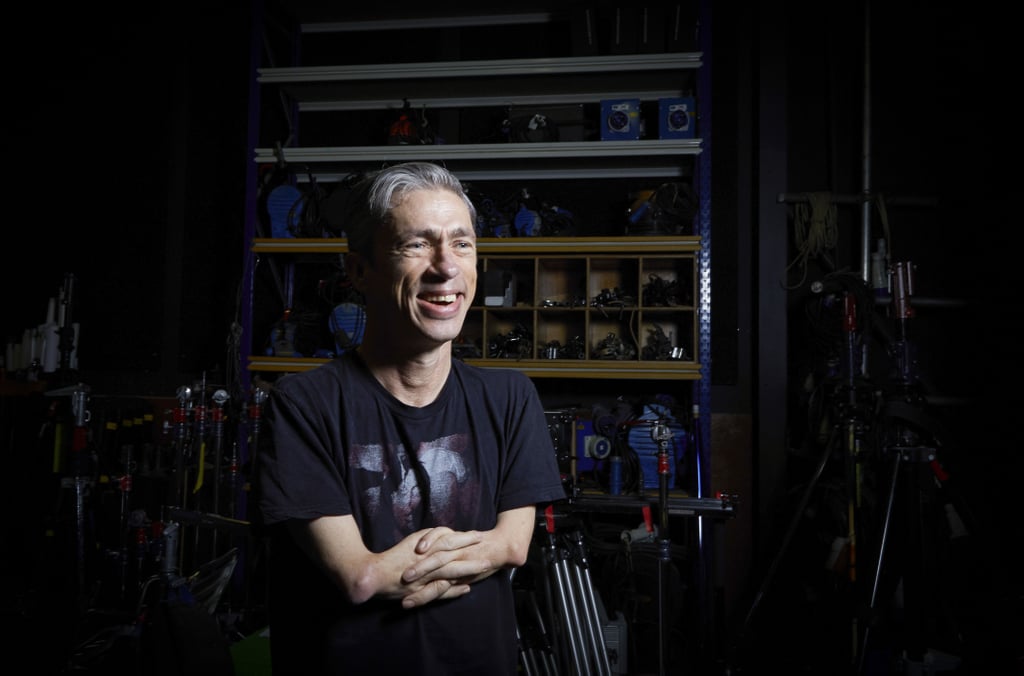
PS: I mean, same.
MF: Certainly as a writer. But most of it is true! I mean, I amalgamated a couple of those stories — two things happen in one story that didn't really happen — but everything is true. All the testimony stuff is true, of course.
I wanted it to be more funny than angry, and I went there. They say, "Don't talk about the acting profession, don't act about acting because you always look like a bad actor." But, I don't know: I was just really motivated to do it. I was being directed by Ewan Marshall, who's a director I really trust. He works me really hard. Harder than is in my comfort zone, which is what I need — certainly on this project. Especially as I'd written it, I had ideas about — maybe I didn't realise I had ideas, but when we got to set, I had ideas about how it should be portrayed that Ewan superseded, and quite rightly. Always listen to my director.
"It is cheeky, and I am a bit nervous about my next audition in front of people if they've seen it."
So, I am actually pretty pleased. It is cheeky, and I am a bit nervous about my next audition in front of people if they've seen it. I hadn't thought about it while I writing it, but what happens if I go into an audition with a casting director who's seen "Audition," my monologue, and is now nervous because of how they think I'm going to be with them?
![PS: I mean, I hope it's a learning experience. Something that struck me in your monologue was the aftercare emails that, you said, are "to really drive home the point they don't even know they're making!" The way you rattle them off: it felt so painfully obvious and, just, biting.
MF: A casting director did actually tell me, 'cause I showed it to her, she said: "You know we give emails like that to most people." And I was like, yeah, yeah, yeah, sure you do, yeah. But then, you don't now, do you? [laughs] PS: I mean, I hope it's a learning experience. Something that struck me in your monologue was the aftercare emails that, you said, are "to really drive home the point they don't even know they're making!" The way you rattle them off: it felt so painfully obvious and, just, biting.
MF: A casting director did actually tell me, 'cause I showed it to her, she said: "You know we give emails like that to most people." And I was like, yeah, yeah, yeah, sure you do, yeah. But then, you don't now, do you? [laughs]](https://media1.popsugar-assets.com/files/thumbor/GcMmvTznxz2jyhvFcoROG3LbFN8/fit-in/1024x1024/filters:format_auto-!!-:strip_icc-!!-/2020/10/01/969/n/44490375/d5c75c0e790bedef_CRIPTALES_104_28115/i/PS-I-mean-I-hope-it-learning-experience.jpg)
PS: I mean, I hope it's a learning experience. Something that struck me in your monologue was the aftercare emails that, you said, are "to really drive home the point they don't even know they're making!" The way you rattle them off: it felt so painfully obvious and, just, biting.
MF: A casting director did actually tell me, 'cause I showed it to her, she said: "You know we give emails like that to most people." And I was like, yeah, yeah, yeah, sure you do, yeah. But then, you don't now, do you? [laughs]
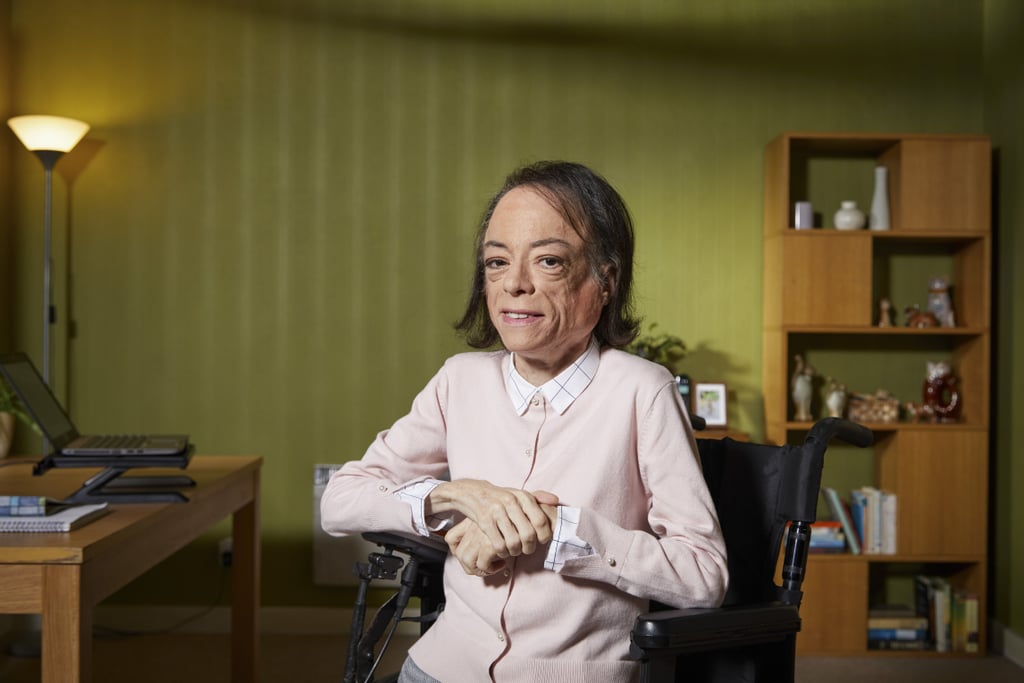
PS: What do you hope viewers get out of this? I hope it's an educational experience, I hope casting gets a lot out of this as well, but for your average viewer, what do you hope they leave with?
"But what I would hope is that they find themselves dissatisfied with lesser portrayals of disability — with less authentic versions of what they know in their insides is the truth — and to not put up with it."
MF: I want the average viewer to enjoy these, obviously. But what I would hope is that they find themselves dissatisfied with lesser portrayals of disability — with less authentic versions of what they know in their insides is the truth — and to not put up with it.
And that's it, really; that's what I want for the audience. For the industry, obviously, I want to encourage that we can do the job, we're really good at doing the job, and we should be promoted to do better jobs next time, because everyone will win awards if we do. And also, you know — I think some television ideas are tired and stale and could do with a refresh. Disability could really refresh a subject there, you know? That's what I think. So I want people to go away thinking, that was awesome. Could we get some more, please?